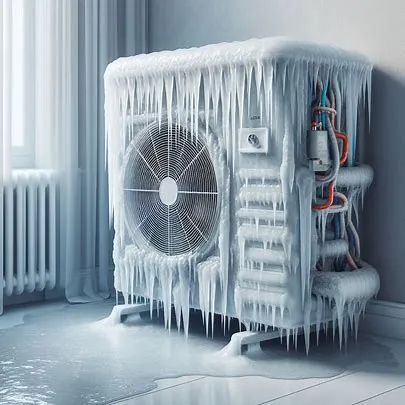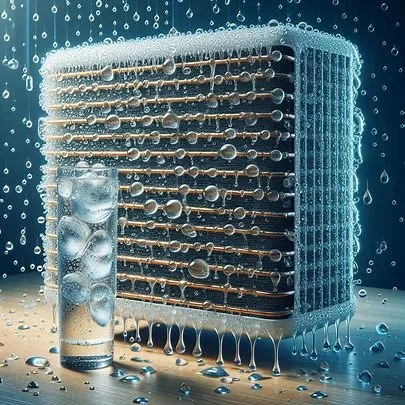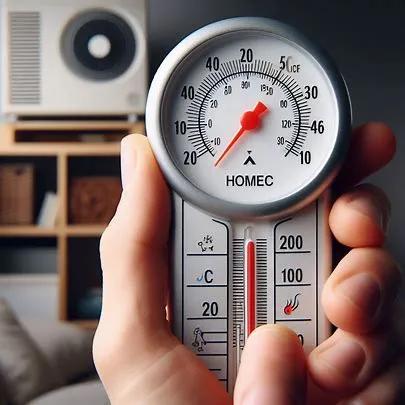
Can AC unit freeze in cold weather? Ever thought your air conditioner might need a winter coat? Believe it or not, these summer lifesavers can actually freeze up in cold weather! Our trusty HVAC systems (heating, ventilation, and air conditioning) keep us cool in the summer and warm in the winter.
But while your AC is a pro at battling hot days, it can struggle a bit during chilly winters.
This article dives into why your AC unit might freeze up in the cold, and more importantly, how to prevent it. We don’t want a frozen AC causing problems or wasting energy, right? So, let’s explore what’s happening and how to keep your cool companion functioning smoothly all year round!
Contents
- 1 How AC Units Work in Cold Weather (HVAC units)
- 2 Why Does Your AC Unit Freeze in Cold Weather?
- 3 The Impact of a Frozen AC Unit
- 4 How to Prevent AC Unit from Freezing up in winter?
- 5 Signs Your AC Unit Might Be Freezing
- 6 What to Do If Your Air Conditioner Unit Freezes
- 7 Conclusion: Can AC unit freeze in cold weather?
How AC Units Work in Cold Weather (HVAC units)

Imagine your air conditioner (AC) like a magic machine that sucks the heat out of your home and throws it outside. Here’s the basic trick:
- The Cool Down Crew: Inside your AC, there’s a special liquid called refrigerant. It’s like a tiny superhero that absorbs heat from the warm air inside your house.
- The Coily Catch: This cool refrigerant travels through special tubes called coils. As it moves through these coils, it absorbs the heat from the air, making the air feel cooler.
- Hot Stuff, Out You Go! Once the refrigerant is loaded with heat, it heads outside to another set of coils. Here, a fan blows air over the coils, carrying the heat away from your house and into the outdoors.
But wait, there’s more! Winter throws a curveball at this process. Here’s a secret weapon your AC uses to avoid freezing up in the cold:
- The Defrost Cycle: Think of this as a built-in “unfreeze” button. During winter, the AC might automatically switch to a defrost cycle. This reverses the process, temporarily stopping the cooling and melting any ice that might have formed on the outside coils.
Now, let’s talk about a special kind of AC called a heat pump. Unlike regular ACs, heat pumps can actually switch gears and work in both heating and cooling modes.
They use the same basic principles but can reverse the flow of refrigerant to act like a heater in the winter!
Why Does Your AC Unit Freeze in Cold Weather?

So, we know your AC acts like a heat-sucking superhero in summer. But why might it freeze up when the weather gets cold? There are a few reasons why this can happen:
- Moisture Monster: Remember how your AC removes heat from the air? Well, that air also carries moisture, like tiny invisible water droplets. When the outside temperature drops, this moisture can condense on the cold outdoor coil of your AC, just like how a cold glass sweats on a hot day. If this moisture doesn’t evaporate quickly, it can freeze and turn into ice.
- Airflow Freeze-Up: Imagine your AC needs good air circulation to work properly, just like you need fresh air to breathe. If your air filters get clogged with dust and dirt, or the vents in your house are blocked by furniture, it can restrict airflow over the outdoor coil. This trapped moisture has a harder time evaporating and can build up as ice.
- Low on Coolant: The special liquid in your AC, the refrigerant, acts like a cooling champ. But if there’s not enough of it circulating, the coils can get much colder than usual. This can create a perfect environment for moisture in the air to freeze even faster.
- Defrost Drama: As mentioned before, your AC has a built-in “unfreeze” button called the defrost cycle. This cycle is supposed to automatically melt any ice that forms on the outdoor coil. However, if this defrost cycle malfunctions, it won’t be able to keep up with the ice buildup, leading to a frozen AC unit.
The Impact of a Frozen AC Unit

A frozen AC unit might seem like a harmless winter wonderland, but it can actually cause some problems for your home comfort and wallet. Here’s what can happen:
- Cooling Down… Not Really: Imagine your AC struggling to push through a thick layer of ice. It can’t function as efficiently, meaning less cool air gets circulated throughout your house. This can leave you feeling warmer than you’d like and force the AC to work harder, leading to…
- Higher Energy Bills: Just like a car uses more gas when it’s struggling to drive uphill, a strained AC uses more energy to try and cool your home. This can result in higher energy bills and leave you scratching your head wondering where all that extra money went.
- Broken Parts, Big Ouch! If ice keeps building up on your AC unit, it can start to damage the delicate parts inside, like the coils and compressor. These repairs can be expensive, so preventing a frozen AC is much better than dealing with a broken one later.
- Safety First: In rare cases, a frozen AC unit can lead to electrical malfunctions or water leaks. While not super common, it’s definitely something to avoid for the safety of your home and family.
How to Prevent AC Unit from Freezing up in winter?
Nobody wants a frosty surprise with their AC unit! Luckily, there are some simple ways to prevent your cool companion from freezing up in the cold:
- Be a Regular with Maintenance: Think of your AC unit like a car. Taking it to a qualified HVAC technician for regular checkups is important. They can identify any potential problems that might lead to freezing before they even start.
- Clean Airflow is Key: Remember how clogged air filters can restrict airflow and lead to ice buildup? Replacing or cleaning your air filters regularly helps ensure good air circulation over the outdoor coil, preventing moisture from turning into ice.
- Winterize for the Season: Just like you might put on a winter coat, some regions recommend winterizing your AC unit. This might involve covering the outdoor unit with a breathable material (check with your local HVAC professional for specific recommendations) or adjusting your thermostat settings to prevent the AC from running unnecessarily during cold snaps.
- Heat Pump Hero (For Some): If you live in a region with mild winters, consider a heat pump! These clever systems can actually reverse the cooling process and act like a heater during the colder months. This eliminates the risk of freezing altogether, but keep in mind they might not be suitable for very cold climates.
Signs Your AC Unit Might Be Freezing

Nobody wants a frozen AC unit, but how do you know if yours is headed for a frosty fate? Here are a few warning signs to watch out for:
- Feeling Less Than Chilly: If your AC suddenly struggles to keep your home cool, even when it’s set to a low temperature, it could be a sign of ice buildup blocking airflow.
- Frosty the AC Unit: This one’s pretty obvious! If you see visible ice forming on the outdoor coil of your AC unit, it’s a clear indication that freezing is happening.
- Strange Sounds: Your AC unit normally has a gentle hum when operating. But if you hear unusual noises, like grinding or clanging, it could be a sign that the defrost cycle is malfunctioning and ice is building up.
What to Do If Your Air Conditioner Unit Freezes
Uh oh, your AC seems to be frozen! Here’s what to do to avoid making things worse:
- Turn Off the Coolant Flow: First things first, shut down the AC by turning off your thermostat. This stops the unit from trying to cool further and potentially causing more ice buildup.
- Let Nature Take its Course: Patience is key here! Resist the urge to blast the outdoor coil with hot water or other methods. These can actually damage the delicate parts of your AC. Instead, let the ice melt naturally. This might take some time, but it’s the safest approach.
- Call in the HVAC Heroes: Once the ice has melted, it’s important to call a qualified HVAC technician. They can diagnose the root cause of the freezing, whether it’s low refrigerant, a clogged filter, or a faulty defrost cycle. Fixing the underlying issue will prevent your AC from becoming a popsicle factory again in the future.
Conclusion: Can AC unit freeze in cold weather?
Phew! We’ve covered a lot about why your AC unit might freeze up in the winter and, more importantly, how to prevent it.
Remember, even though your AC is a pro at battling hot summers, cold weather can cause some unexpected problems.
By taking preventative measures like regular maintenance, cleaning air filters, and winterizing your unit (depending on your region), you can avoid a frozen AC and all the trouble it brings.
This means you’ll enjoy optimal AC performance, keep your energy bills in check, and avoid costly repairs down the line.
- Schedule an HVAC checkup: Consider scheduling a maintenance appointment with a qualified HVAC technician before the winter season hits. They can ensure your AC is in top shape and identify any potential issues that might lead to freezing.
- Stay informed: Keep an eye out for signs of a frozen AC unit, like reduced airflow or ice buildup. Addressing these issues early can prevent them from becoming bigger problems.
With a little knowledge and preventative care, your AC unit can stay cool and collected all year round, keeping you comfortable no matter the season!